New English Short Stories for speaking practice.
Learn speaking through English Short stories
कहानी पढ़ें, कठिन शब्दों के अर्थ के साथ और कहानी को ( Story telling ) English में बोलने की कोशिश करें। इससे आपकी बोलने की क्षमता बढ़ेगी। और आपका word vocabulary भी बढ़ेगा। If you know use of Tenses, Modal Verbs and Conditional Sentences, then you can easily speak English fluently.
You can also learn English quickly through our Daily Quiz. नीचे कुछ कहानियां दी गई हैं और उनमें इस्तमाल हुए मुश्किल शब्दों के अर्थ भी दिया गया है कि आप उन्हें अच्छे से समझ जाएंगे।
English short stories no.1 about Wolf and the lamb
1. Wolf and the Lamb

Once, a little lamb (भेड़ी का बच्चा) was grazing on a meadow (घास का मैदान), along with a flock (झुन्ड) of sheep.
Being very mischievous (नटखट), the little lamb wandered (भटक गया) some distance away from the sheep. It began to enjoy the fresh and delicious (स्वादिष्ट) grass that it found there. It had come a long way from its group, but was unaware (अनजान) of that.
The lamb was also unaware of another fact: a wolf was closely (सामने से) following it!
When the lamb realized that it had lost its way and was far away from the flock, it decided to return and join them. However, the lamb was stunned (भौंचक्का रह गया) to see a hungry and cunning wolf standing behind it.
The lamb realized that there was no option except (सेवाय) to surrender itself to the wolf.
The lamb asked the wolf, “Are you going to eat me?”
The wolf said, “Yes, at any cost!”
The lamb said again, “But can you please wait for some more time? I have eaten a lot of grass now and my stomach is filled with grass. If you eat me now, you will feel as though (मानों जैसे) you are eating grass! So please wait until the grass is digested.”
The wolf agreed, “Oh yes, I will wait. You are here before me and I can wait for some more time!”
The lamb thanked the wolf.
After some time, the wolf got ready to kill lamb, but the lamb stopped him again.
“Dear wolf, please wait for some more time. The grass is yet to be digested. If you eat me now, you will see a lot of grass in my stomach! Let me dance and then it will be digested easily.”
The wolf agreed.
The little lamb danced crazily (पागलों की तरह) for a while, and then suddenly stopped.
The wolf enquired (पूछा) what had happened.
The lamb said, “I cannot dance properly because there is no music. You see this bell around my neck? Can you untie this bell and ring it loudly? Then I can dance fast and the grass in my stomach also will get digested fast.”
The wolf, overcome (काबू पाया) with the desire to eat the lamb, was ready to do anything. He removed the bell tied to the lamb’s neck and rang it with all his might.
Meanwhile, the shepherd (चरवाहा) was searching for the little lamb and heard the bell ringing. He saw the wolf and the lamb. He ran towards (के तरफ) the wolf with a stick.
Seeing the shepherd with a stick, the wolf ran away, and the lamb was saved!
Moral of the story:
Physical strength is not sufficient. Sometimes, weaker people with smart minds can overcome the physically strong ones!
English short stories no.2 about an ant and the Grasshopper
2. The Ant and the Grasshopper
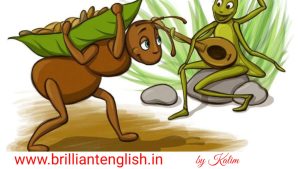
One summer’s day, in a field, a Grasshopper was hopping about, chirping (चहचाहाना) and singing to its heart’s content ( मन भरके). An Ant passed by, bearing along with (अपने साथ लिए हुए) great effort an ear of corn he was taking to his nest.
“Why don’t you come and chat with me,” asked the Grasshopper, “instead of toiling (संघर्ष करना) your life away?”
“I am helping to store up food for the winter,” said the Ant, “and I recommend (सलाह) you to do the same.”
“Why bother (चिंता) about winter?” said the Grasshopper. “We have got plenty (बहुत) of food at present.”
But the Ant went on its way and continued its toil.
When winter came, the Grasshopper found itself dying of hunger, while it saw the ants distributing, every day, corn and grain from the stores they had collected in summer.
Then the Grasshopper knew the importance of planning for future.
Moral:
Work Today And You Can Reap The Benefits Tomorrow!
English short stories no.3 about the greedy mouse
3. The Greedy Mouse

A greedy (लालची) mouse saw a basket full of corn. He wanted to eat it. So he made a small hole in the basket. He squeezed (घुसना) in through the hole. He ate a lot of corn. He felt full and was very happy.
Now he wanted to come out. He tried to come out through the small hole. He could not. His belly (पेट) was full. He tried again. But it was of no use.
The mouse started crying. A rabbit was passing by (पास से गुजरा). It heard the mouse’s cry and asked, “Why are you crying, my friend?”
The mouse explained, “I made a small hole and came into the basket to eat the corn. Now I am not able to get out through that hole.”
The rabbit said, “It is because you ate too much. Wait till your belly shrinks (सिकुड़ना) .” The rabbit laughed and went away.
Greedy Mouse The mouse fell asleep (सो गया) in the basket. The next morning his belly had shrunk. But he wanted to eat some more corn. He forgot all about getting out of the basket. So he ate the corn and his belly was really big again.
After eating, the mouse remembered that he had to escape. But obviously, he could not. So he thought, “Oh! Now I will go out tomorrow.”
The cat was the next passerby (बगल से गुजरने वाला). He smelt the mouse in the basket. He lifted (उठाया) its lid (ढक्कन) and ate the mouse.
Moral
Think before you leap
English short stories no.4 about unhelpful friends
4. Unhelpful Friends

Bunny rabbit lived in the forest. He had many friends. He was proud of his friends. One day Bunny rabbit heard the loud barking of wild (जंगली) dogs. He was very scared (डर गया).
He decided to ask for help. He quickly went to his friend deer. He said, “Dear friend, some wild dogs are chasing ( पीछा करना) me. Can you chase them away with your sharp antlers?”
The deer said, “That is right, I can. But now I am busy. Why don’t you ask bear for help?”
Bunny rabbit ran to the bear. “My dear friend, you are very strong. Please help me. Some wild dogs are after me. Please chase them away,” he requested to the bear.
The bear replied, “I am sorry. I am hungry and tired. I need to find some food. Please ask the monkey for help.”
Poor Bunny went to the monkey, the elephant, the goat and all his other friends. Bunny felt sad (बुरा लगा) that nobody was ready to help him.
He understood that he had to think of a way out by himself. He hid under a bush (झाड़). He lay very still. The wild dogs did not find the bunny. They went chasing other animals.
Bunny rabbit learnt that he had to learn to survive (ज़िंदा रहना) by himself, not depending on his unhelpful ( मदद नहीं करने वाले) friends.
Moral:
It is better to rely on yourself than depend on others.
English short stories no.5 about the crystal ball
5. The Crystal Ball
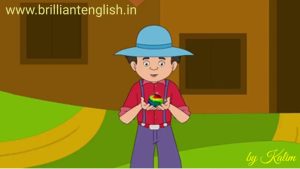
In the south of Spain, there was a small village whose (जिसके) people were very joyful. The children played under the shades (छाया) of trees in the gardens of their homes.
A shepherd boy named Nasir stayed near the village with his father, mother and grandmother. Each morning, he took his herd of goats (बकरियों का झुंड) up the hills to find a suitable place for them to graze (चराना). In the afternoon he would return with them to the village.
Each night his grandmother would tell him a story – the story of stars. This story really interested Nasir.
On one of those days, as Nasir was watching his herd and playing his flute, he suddenly saw a wonderful light behind a flower bush. When he approached (पास आया) the bush, he saw a transparent (आरपार दिखने वाला) and very beautiful crystal ball.
The crystal ball was glittering (चमकना) like a colorful rainbow. Nasir carefully took it in his hand and turned it around. With surprise, suddenly, he heard a weak voice (धीमी आवाज़) coming from the crystal ball. It said, “You can make a wish that your heart desires and I will fulfill (पूरा करना) it.”
Nasir could not believe that he had actually heard a voice. When he made sure that he had indeed (सचमुच) heard that voice from the crystal ball, he was very confused. He had so many wishes that he could not decide upon one particular wish.
He said to himself, ‘if I wait till tomorrow I will remember many things. Then I will make my wish.’
He put the crystal ball in a bag and, gathering (जमा किया) the herd, happily returned to the village. He decided that he would not tell anyone about the crystal ball.
On the following day also, Nasir could not decide what to wish for, because he really had everything he needed.
The days passed (दिन बीतता गया) as usual, but Nasir was still unable to make his wish. But he appeared to be very cheerful. The people around him were amazed to see the change in his disposition.
One day, a boy followed Nasir and his herd and hid behind a tree. Nasir, as usual, sat in one corner, took out the crystal ball and for a few moments looked at it. The boy waited for the moment when Nasir would go to sleep.
When Nasir did fall asleep after a while, the boy took the crystal ball and ran away ( भाग गया).
When he arrived at the village, he called all the people and showed them the crystal ball. The citizens (नागरिक) of that village took the crystal ball in their hands and turned it around with surprise. Suddenly they heard a voice from inside the crystal ball, which said, “I can fulfill your wish.” One person took the ball and screamed, “I want one bag full of gold.”
Another took the ball and said loudly, “I want two chests full of jewelry.” Some of them wished that they would have their own palace with a grand door made from pure gold, instead of their old houses. Some others wished for bags full of jewelry.
All their wishes (इच्छाएं) were fulfilled (पूरा हुआ), but still the citizens of the village were not happy.
They were jealous because the person that had a palace had no gold and the person that had the gold had no palace. For this reason, the citizens of the village were angry with each other and stopped speaking to each other.
The gardens in the village where children used to play were no more. There were palaces and gold everywhere. The children became terribly unhappy. Only Nasir and his family were happy and contented (संतुष्ट). Every morning and afternoon he would play the flute.
One day the children of the village took the crystal ball to Nasir. The children said to Nasir, “When we had a small village, we all were happy and joyful.” The parents also spoke. They said, “In one way or another, all of us are unhappy. The luxurious palaces and jewelry only bring us pain.”
When Nasir saw that the people were really regretful, he said, “Even though (भले ही) the crystal ball asked me to wish for something, I have not done it so far. But if you really want everything to return to its own place, then I will wish for it.”
Everyone happily agreed. Nasir took the crystal ball in his hand, turned it around and wished that the village would become the same as it was before. In a moment, the palaces disappeared (गायब हो गया), the green gardens appeared, and the same old village full of trees was there.
English short stories no.6 about the Devoted Mother
6. The Devoted Mother

A mother duck and her little ducklings (बतख के बच्चे) were on their way to a lake (झील) one day. The ducklings were very happy following their mother and quack-quacking along the way.
All of a sudden, the mother duck saw a fox at a distance. She was frightened (डर गया), and shouted, “Children, hurry to the lake. There’s a fox!”
The ducklings hurried (जल्दी जल्दी) towards the lake. The mother duck wondered what to do. Then she began to walk back and forth dragging one wing on the ground.
Devoted Mother When the fox saw her, he became happy. He said to himself, “It seems she’s hurt and can’t fly! I can easily catch and eat her!” He ran towards her.
The mother duck ran, leading the fox away from the lake. The fox followed her. Now he wouldn’t be able to harm her ducklings. The mother duck looked towards her ducklings and saw that they had reached the lake. She was relieved, so she stopped and took a deep breath (गहरी सांस).
The fox thought that she was tired and he came closer (करीब), but the mother duck quickly spread (फैलाना) her wings (पंख) and rose up in the air. She landed in the middle of the lake and her ducklings swam to her.
The fox stared in disbelief at the mother duck and her ducklings. The mother duck had tricked (चकमा दिया) him cleverly. Now he could not reach them because they were in the middle of the lake.
English short stories no.7 about change yourself and not the world
7. Change Yourself and not The World

Long ago, people lived happily under the rule of a king. The people of the kingdom (साम्राज्य) were very happy as they led a very prosperous (खुशहाल) life with an abundance (प्रचुरमात्रा में) of wealth and no misfortunes.
Once, the king decided to go visiting places of historical importance and pilgrim (तीर्थ स्थल) centres at distant places. He decided to travel by foot to interact (बात करना) with his people. People of distant places were very happy to have a conversation with their king. They were proud that their king had a kind heart.
After several (कई) weeks of travel, the king returned to the palace (महल). He was quite happy that he had visited many pilgrim centres and witnessed (अपने आंखों से देखा) his people leading (बिताना) a prosperous life. However (फिर भी), he had one regret (अफ़सोस).
He had intolerable (नाकाबिले बर्दाश्त) pain in his feet as it was his first trip by foot covering a long distance. He complained to his ministers that the roads weren’t comfortable and that they were very stony (पथरीली).
He could not tolerate (बर्दाश्त करना) the pain. He said that he was very much worried about the people who had to walk along those roads as it would be painful for them too!
Considering all this (ये सब जानते हुए), he ordered his servants to cover the roads in the whole country with leather (चमड़ा) so that the people of his kingdom can walk comfortably.
The king’s ministers were stunned to hear his order as it would mean that thousands of cows would have to be slaughtered (कत्ल करना) in order to get sufficient (पर्याप्त) quantity of leather. And it would cost a huge amount of money also.
Finally, a wise (बुद्धिमान) man from the ministry came to the king and said that he had another idea. The king asked what the alternative was. The minister said, “Instead of covering the roads with leather, why don’t you just have a piece of leather cut in appropriate (उचित) shape to cover your feet?”
The king was very much surprised by his suggestion (सलाह) and applauded the wisdom (ज्ञान) of the minister. He ordered a pair of leather shoes for himself and requested all his countrymen also to wear shoes.
Moral:
Instead of trying to change the world, we should try to change ourselves.
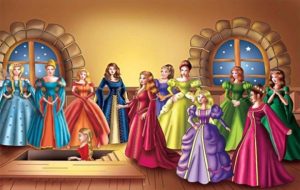
8. Dancing Princesses
There was a king who had twelve beautiful daughters. They slept in twelve beds all in one room; and when they went to bed, the doors were shut and locked up; but every morning their shoes were found to be quite worn (घिसना) through as if (मानों) they had been danced in all night; and yet nobody could find out how it happened, or where they had been.
Then the king made it known to all the land, that if any person could discover (पता लगाना) the secret, and find out where क it was that the princesses danced in the night, he should have the one he liked best for his wife, and should be king after his death; but whoever (जो कोई भी) tried and did not succeed, after three days and nights, should be put to death.
A king’s son soon came. He was well entertained, and in the evening was taken to the chamber (कमरा) next to the one where the princesses lay in their twelve beds.
There he was to sit and watch where they went to dance; and, in order that nothing might pass without his hearing it, the door of his chamber was left open. But the king’s son soon fell asleep; and when he awoke in the morning he found that the princesses had all been dancing, for the soles of their shoes were full of holes.
The same thing happened the second and third night: so the king ordered his head to be cut off. After him came several others; but they had all the same luck, and all lost their lives (अपना जान गंवा दिए) in the same manner.
Now it chanced that an old soldier, who had been wounded in battle and could fight no longer, passed through the country where (जहां) this king reigned (शासन करता था) :
and as he was travelling through a wood (जंगल), he met an old woman, who asked him where he was going. ‘I hardly know where I am going, or what I had better do,’ said the soldier; ‘but I think I should like very well to find out where it is that the princesses dance, and then in time I might be a king.’ ‘Well,’ said the old dame, ‘that is no very hard task:
only take care not to drink any of the wine which one of the princesses will bring to you in the evening; and as soon as she leaves you pretend to be fast asleep.’
Then she gave him a cloak, and said, ‘As soon as you put that on you will become invisible, and you will then be able to follow the princesses wherever (जहां कहीं भी) they go.’ When the soldier heard all this good counsel, he determined (इरादा किया) to try his luck: so he went to the king, and said he was willing to undertake the task.
He was as well received as the others had been, and the king ordered fine royal robes to be given him; and when the evening came he was led to the outer chamber.
Just as he was going to lie down, the eldest of the princesses brought him a cup of wine; but the soldier threw it all away secretly (चुपके से), taking care not to drink a drop. Then he laid himself down on his bed, and in a little while began to snore (खर्राटा लेना) very loud as if he was fast asleep.
When the twelve princesses heard this they laughed heartily; and the eldest said, ‘This fellow too might have done a wiser thing than lose his life in this way!’ Then they rose up (उठी) and opened their drawers and boxes, and took out all their fine clothes, and dressed themselves at the glass, and skipped about as if they were eager to begin dancing.
But the youngest said, ‘I don’t know how it is, while you are so happy I feel very uneasy (बेचैनी); I am sure some mischance (कुछ मुसीबत) will befall us.’ ‘You simpleton,’(मुर्ख) said the eldest, ‘you are always afraid; have you forgotten how many kings’ sons have already watched in vain? And as for this soldier, even if I had not given him his sleeping draught (घोंट), he would have slept soundly enough.’
When they were all ready, they went and looked at the soldier; but he snored on, and did not stir hand or foot: so they thought they were quite safe; and the eldest went up to her own bed and clapped her hands, and the bed sank into the floor and a trap-door flew open.
The soldier saw them going down through the trap-door one after another, the eldest leading the way; and thinking he had no time to lose, he jumped up, put on the cloak which the old woman had given him, and followed them; but in the middle of the stairs he trod on the gown of the youngest princess, and she cried out to her sisters, ‘All is not right; someone took hold of my gown.’ ‘You silly creature!’ said the eldest, ‘it is nothing but a nail in the wall.’ Then down they all went, and at the bottom they found themselves in a most delightful grove of trees; and the leaves were all of silver, and glittered and sparkled beautifully.
The soldier wished to take away some token of the place; so he broke off a little branch, and there came a loud noise from the tree. Then the youngest daughter said again, ‘I am sure all is not right—did not you hear that noise? That never happened before.’ But the eldest said, ‘It is only our princes, who are shouting for joy at our approach.’
Then they came to another grove of trees, where all the leaves were of gold; and afterwards to a third, where the leaves were all glittering diamonds. And the soldier broke a branch from each; and every time there was a loud noise, which made the youngest sister tremble with fear; but the eldest still said, it was only the princes, who were crying for joy. So they went on till they came to a great lake; and at the side of the lake there lay twelve little boats with twelve handsome princes in them, who seemed to be waiting there for the princesses.
One of the princesses went into each boat, and the soldier stepped into the same boat with the youngest. As they were rowing over the lake, the prince who was in the boat with the youngest princess and the soldier said, ‘I do not know why it is, but though I am rowing with all my might we do not get on so fast as usual, and I am quite tired: the boat seems very heavy today.’ ‘It is only the heat of the weather,’ said the princess: ‘I feel it very warm too.’
On the other side of the lake stood a fine illuminated castle (जगमगाता महल) from which came the merry music of horns and trumpets.
There they all landed, and went into the castle, and each prince danced with his princess; and the soldier, who was all the time invisible, (गायब) danced with them too; and when any of the princesses had a cup of wine set by her, he drank it all up, so that when she put the cup to her mouth it was empty.
At this, too, the youngest sister was terribly frightened, but the eldest always silenced (चुप कराई) her. They danced on till three o’clock in the morning, and then all their shoes were worn out (घिस गये), so that they were obliged to leave off. The princes rowed (नाव चलाकर) them back again over the lake (but this time the soldier placed himself in the boat with the eldest princess); and on the opposite shore they took leave of each other, the princesses promising to come again the next night.
When they came to the stairs (सीढियां), the soldier ran on before the princesses, and laid himself down; and as the twelve sisters slowly came up very much tired, they heard him snoring in his bed;
so they said, ‘Now all is quite safe’; then they undressed themselves, put away their fine clothes, pulled off their shoes, and went to bed. In the morning the soldier said nothing about what had happened, but determined to see more of this strange (अजीब) adventure (सहासिक कार्य) , and went again the second and third night; and every thing happened just as before;
the princesses danced each time till their shoes were worn to pieces, and then returned home. However, on the third night the soldier carried away one of the golden cups as a token (निशानी के तौर पर) of where he had been.
English short stories no. 9 about a glass of milk
9. A Glass of Milk
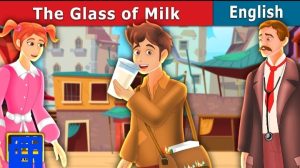
Once, there was a poor boy who made a living by selling various objects from door to door. This was the way he earned money to pay for his school.
One day, as he was walking from house to house as usual, he felt very hungry and weak. He felt that he couldn’t walk even a few steps. He decided to ask for food at a house. He knocked on the door and was stunned to see a beautiful young girl open the door. With much hesitation, he asked the girl for a glass of water.
The young girl understood his condition and offered him a huge glass of milk. With an astonished look, the boy drank the milk very slowly.
“How much do I owe you for this milk?” he asked her.
The girl replied, “I do not want any money for this.”
The boy thanked the girl from the bottom of his heart and left the place.
Years passed by. The young girl grew up. In her youth, unfortunately, she fell ill and was diagnosed with the rarest kind of nervous disorder. Many experienced doctors were baffled at her condition, and she was admitted in the city hospital with the most advanced facilities.
Dr. Kevin, a renowned neuro specialist was called in by the hospital to examine her. Even with his extraordinary expertise, Dr. Kevin found the girl’s illness very hard to cure. However, with perseverance and hard work that lasted months, he was finally able to get the disease under control. With careful medication and monitoring, the girl was completely cured in the end.
Everyone praised the doctor, but the girl was quite worried about how much the hospital bill would come to. Her family had just a little money kept away in the bank, which was by no means enough to pay for such a long treatment in that reputed hospital.
The girl was given the hospital bill finally. With trembling hands, she opened it. She was stunned to see that the bill had been crossed out and cancelled, and there was a note underneath signed by Dr. Kevin.
“Bill paid years ago with a glass of milk!”
Moral: One good turn begets another.
English short stories No. 10 about the willow-Wren and the bear
10. The Willow-Wren and the Bear

Once in summer-time the bear and the wolf were walking in the forest, and the bear heard a bird singing so beautifully that he said: ‘Brother wolf, what bird is it that sings so well?’ ‘That is the King of birds,’ said the wolf, ‘before whom we must bow down.’ In reality the bird was the willow-wren.
‘IF that’s the case,’ said the bear, ‘I should very much like to see his royal palace;
come, take me thither.’ ‘That is not done quite as you seem to think,’ said the wolf; ‘you must wait until the Queen comes,’ Soon afterwards, the Queen arrived with some food in her beak, and the lord King came too, and they began to feed their young ones.
The bear would have liked to go at once, but the wolf held him back by the sleeve, and said: ‘No, you must wait until the lord and lady Queen have gone away again.’ So they took stock of the hole where the nest lay, and trotted away.
The bear, however, could not rest until he had seen the royal palace, and when a short time had passed, went to it again.
The King and Queen had just flown out, so he peeped in and saw five or six young ones lying there. ‘Is that the royal palace?’ cried the bear; ‘it is a wretched palace, and you are not King’s children, you are disreputable children!’ When the young wrens heard that, they were frightfully angry, and screamed: ‘No, that we are not! Our parents are honest people! Bear, you will have to pay for that!’
The bear and the wolf grew uneasy, and turned back and went into their holes. The young willow-wrens, however, continued to cry and scream, and when their parents again brought food they said: ‘We will not so much as touch one fly’s leg, no, not if we were dying of hunger,
until you have settled whether we are respectable children or not; the bear has been here and has insulted us!’ Then the old King said: ‘Be easy, he shall be punished,’ and he at once flew with the Queen to the bear’s cave, and called in:
‘Old Growler, why have you insulted my children? You shall suffer for it—we will punish you by a bloody war.’ Thus war was announced to the Bear, and all four-footed animals were summoned to take part in it, oxen, asses, cows, deer, and every other animal the earth contained.
And the willow-wren summoned everything which flew in the air, not only birds, large and small, but midges, and hornets, bees and flies had to come.
When the time came for the war to begin, the willow-wren sent out spies to discover who was the enemy’s commander-in-chief. The gnat, who was the most crafty, flew into the forest where the enemy was assembled, and hid herself beneath a leaf of the tree where the password was to be announced.
There stood the bear, and he called the fox before him and said: ‘Fox, you are the most cunning of all animals, you shall be general and lead us.’ ‘Good,’ said the fox, ‘but what signal shall we agree upon?’
No one knew that, so the fox said: ‘I have a fine long bushy tail, which almost looks like a plume of red feathers.
When I lift my tail up quite high, all is going well, and you must charge; but if I let it hang down, run away as fast as you can.’ When the gnat had heard that, she flew away again, and revealed everything, down to the minutest detail, to the willow-wren.
When day broke, and the battle was to begin, all the four-footed animals came running up with such a noise that the earth trembled.
The willow-wren with his army also came flying through the air with such a humming, and whirring, and swarming that every one was uneasy and afraid, and on both sides they advanced against each other. But the willow-wren sent down the hornet, with orders to settle beneath the fox’s tail, and sting with all his might.
When the fox felt the first string, he started so that he lifted one leg, from pain, but he bore it, and still kept his tail high in the air; at the second sting, he was forced to put it down for a moment; at the third, he could hold out no longer, screamed, and put his tail between his legs.
When the animals saw that, they thought all was lost, and began to flee, each into his hole, and the birds had won the battle.
Then the King and Queen flew home to their children and cried: ‘Children, rejoice, eat and drink to your heart’s content, we have won the battle!’ But the young wrens said: ‘We will not eat yet, the bear must come to the nest, and beg for pardon and say that we are honourable children,
before we will do that.’ Then the willow-wren flew to the bear’s hole and cried: ‘Growler, you are to come to the nest to my children, and beg their pardon, or else every rib of your body shall be broken.’ So the bear crept thither in the greatest fear, and begged their pardon.
And now at last the young wrens were satisfied, and sat down together and ate and drank, and made merry till quite late into the night.
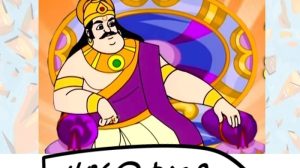
11. Health is Wealth
Once upon a time, there lived a generous and kind-hearted king. But the people weren’t happy with their king because the king was very lazy and would not do anything other than eating and sleeping.
He spent days and weeks and months in his bed either eating something or sleeping. The king became a potato couch and the people started to worry about the king.
One day, the king realized that he couldn’t even move his body, not even his foot. He became very fat and his enemies made fun of him, calling him ‘fatty king’, ‘bulky king’ etc.
The king invited expert doctors from various parts of his country and offered them generous rewards to make him fit. Unfortunately, none could help the king gain his health and fitness.
The king spent enormous amounts of money but everything went in vain.
One fine morning, a holy man visited the country. He heard about the ill-health of the king, and informed the minister at the palace that he could easily cure the king.
Hearing these promising words, the minister became very happy. He requested the king to meet the holy man to get rid of his problem.
The holy man resided at a distant place. Since the king could not move his body, he asked the minister to bring the holy man to the palace, but the holy man refused. He said that the king had to go to him, in order to get cured.
After strenuous efforts, the king met the holy man at the latter’s residence. The holy man complimented the king saying that he was a good ruler, and said that he would soon regain his health.
He asked the king to come for treatment the next day. He told the king also that the king would be treated only if he came on foot to the holy man’s residence.
The King was unable to walk even a few steps on the road, but aided by his followers, he reached the holy man’s place.
Unfortunately, the holy man was not available there and his devotee requested the king to come and meet him the next day for treatment.
This was repeated for two weeks and the king never met the holy man, and never had any treatment.
Gradually, the king realized that he felt a lot lighter, lost a considerable amount of weight and felt more active than before. He realized the reason why the holy man asked him to reach his place by walking.
Very soon, the king regained his health, and the people were very happy in his kingdom.
Health is Wealth!




